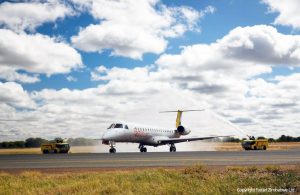“The river might dry before we enjoy it”-Maun poler
Ngamilanders have waited with bated breath for the Thamalakane River to start flowing again.
Last year, very little rainfall and drought caused the river which is a source of livelihood for Maun village to dry up.
For months on end villagers kept watch of the flow of the river all the way from Angola, through Namibia to the tributaries of the Okavango Delta where it is currently reported to be at.
Villagers and tourist ‘s excitement was however dampened by the announcement of a 28- day lockdown to fight corona virus Pandemic last week
News that the lockdown might be extended depending on the public’s response to Covid 19 further brought disillusionment to those who were hopeful that they would get to enjoy the spectacular sight that is Thamalakane river at the end of the month.
“The water may even dry up before we enjoy it or even just take a glimpse at the flow because corona virus has forced us to go into an indefinite lockdown,” expressed Rebaone Masedi.
A poler by profession, Masedi has been looking forward to a promising peak year in the tourism industry and how his hope has been quashed. “ It looks like God has suspended this year. Everything is on hold as we shift our focus on to how to stay alive!”

According to a Xhaxhaba resident, a settlement deep in the Okavango Delta, the water is slowly but surely moving towards Boro River and other water channels, which will then feed into Thamalakane river.
“As of yesterday, we were informed that the water has filled up Xhaxhaba channels and moving closer to Thamalakane. We expect it to reach Thamalakane before the end of this month,” explained Bojanala councillor, Luke Motlaleselelo this week.
Thamalakane river remains a lifeline for many residents of Maun and surrounding areas. With the flood comes opportunities for fishery, harvesting of water lilies, boat cruises and other tourism adventures. However with the lockdown this seems like a distance dream to many in Maun.
Last year the water did not fill up as the water dried up about thirty kilometres before reaching the river, forcing hundreds of polers to relocate to Daunara where they spent had spent the past year competing to take tourists on boat cruises.














